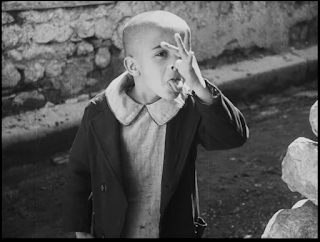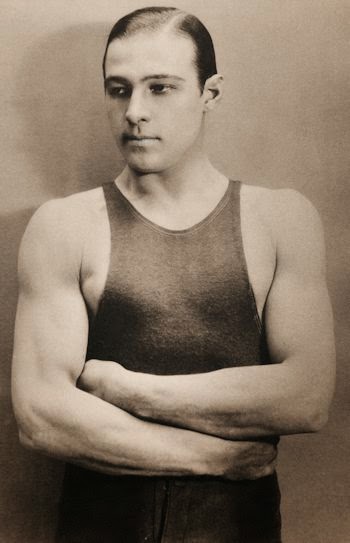Pordenone Diary - Day 5
 |
| MOOD that the festival is 1/2 over |
Pordenone Diary – Day 5
It is hard to believe that we are now halfway through the Le
Giornate del Cinema Muto Limited Edition. We’re at day 5 and I am just falling
further and further behind in both watching and reporting. My day 5 was
consumed by an exhausting visit to the San Francisco Department of Motor
Vehicles because my license was set to expire on October 10th. With
the pandemic, yes, I have been procrastinating. In any case, this visit, while
ultimately successful, wore me out completely draconian and archaic. I was
later watching the film today and in no mood to blog about it on the day. TMI, I apologize!
My mood was melancholic seeing Jay Weissberg walking through an introducing the film of the day from the Teatro Verdi. Mind, I have not actually traveled to Pordenone for the festival and have no then crossed the threshold of the Verdi. Still, my heart twisted at what we’re missing with this online event. This is made more so by the raw feelings of so many of my friends who are missing Pordenone for legitimate reasons than mine. The collegial atmosphere of watching these remarkable films together is certainly missing. The online gatherings only hint at what lovely evenings will be spent in 2021 at the real Bar Posta discussing the films opposed to the virtual Zoom Posta. I need not qualify here that the online discussions have been delightful.
 |
| Maestro Neil Brand |
Given my trial at the DMV, I missed the masterclass with Neil Brand but for a few minutes watching in the morning. I meant to catch it later and was thwarted by my own lack of energy. I hope it does end up on the Le Giornate YouTube channel. Likewise, missed the Filmfair Book Presentation. Sigh, I wonder how I am going to keep up the pace at the festival itself knowing how many events are happening. I’m failing online!
 |
| The Acropolis |
Unlike the previous films, no short film and no archival tour before the feature. The film was Greece’s first sound film, music and effects, is missing the sound original discs. Thought lost for decades, OI APACHIDES TON ATHINON (GR 1930) (Le Prince des Gueux; Les Apaches d’Athènes) [The Apaches of Athens] was discovered at a French market stall (unless I misheard Jay Weissberg). Those legendary French stalls of books, films and art; I dream of finding some lost treasure there myself on day.
This film directed by Dimitrios Gaziades is part documentary of life in the tougher areas of Athens, at the foot of the Acropolis and newly minted millionaires. At times frothy, the comedy and drama are played out in a very realistic fashion. The film is actually a screen adaptation of an operetta from the early 1920s which was hugely popular (and all but forgotten today). The tale of an “orphan” Petros who is known in the local neighborhood as “Prince.” “Prince” he may be, but, he’s poorer than dirt, as we first find him sleeping and ignoring his irate landlord demanding payment of back rent. He and his two close pals are members of the club of the empty bellies. Nary any of them with a coin between them, they scrape and scrap to earn money to eat.
 |
| Everyone's favorite thing, the Chaplin postcard |
Petros has won the heart of a local flower seller Titica. She carries a big old torch for him and he seems a bit sweet on her, too. They meet on the street where she is selling flowers, he shows his empty pockets and she offers him a flower which he refuses. He also refuses her offer of the loan of some money.
Soon thereafter, as he walks along he gets caught up in the local game of stone throwing. Seems fairly serious game as he is struck and is injured. Titica nurses him along with his two friends. Her devotion to him costing her dearly when she returns home having sold no flowers. Her “caregiver” beats her for her kindnesses.
The twist in the story comes in the way of a rival named Vera, well to do, well heeled and thrown from her horse practically in front of Petros. He helps her, she offers him money which he refuses (gift horse in the mouth and all that). Vera is sweet on her knight in less than shining armor.
Well among other plot twists, this is based on an operetta where stranger things have been known to happen, Petros is heir to a fortune, though he does not yet know it. Will Petros end up with Vera or the loyal Titica? I’m not going to spoil it!
The print was lovely, in very good shape and a nice restoration by the Cinémathèque Française. Regarding the score, I will quote from the Le Giornate website, “Ioannis Tselikas of the Hellenic Music Centre in Athens reconstructed the music tracks based on the operetta’s score, with the addition of three new songs that were specially composed for the film. The final sound mix on the DCP includes original recordings of the period and a new recording by the Greek Radio Symphony Orchestra and singers from the Greek National Opera, conducted by Anastasios Simeonidis.” I very much enjoyed the music and the vocals. I had initially feared there would also be spoken dialogue like has been done for the silent missing its soundtrack The Donovan Affair which gave me an almighty headache when it screened in San Francisco.
This was my first silent film from Greece and it was a delightful film in every way. Imaginative, fun, sweet and romantic, all in the shadow of ancient history.
On to Day 6!










Comments